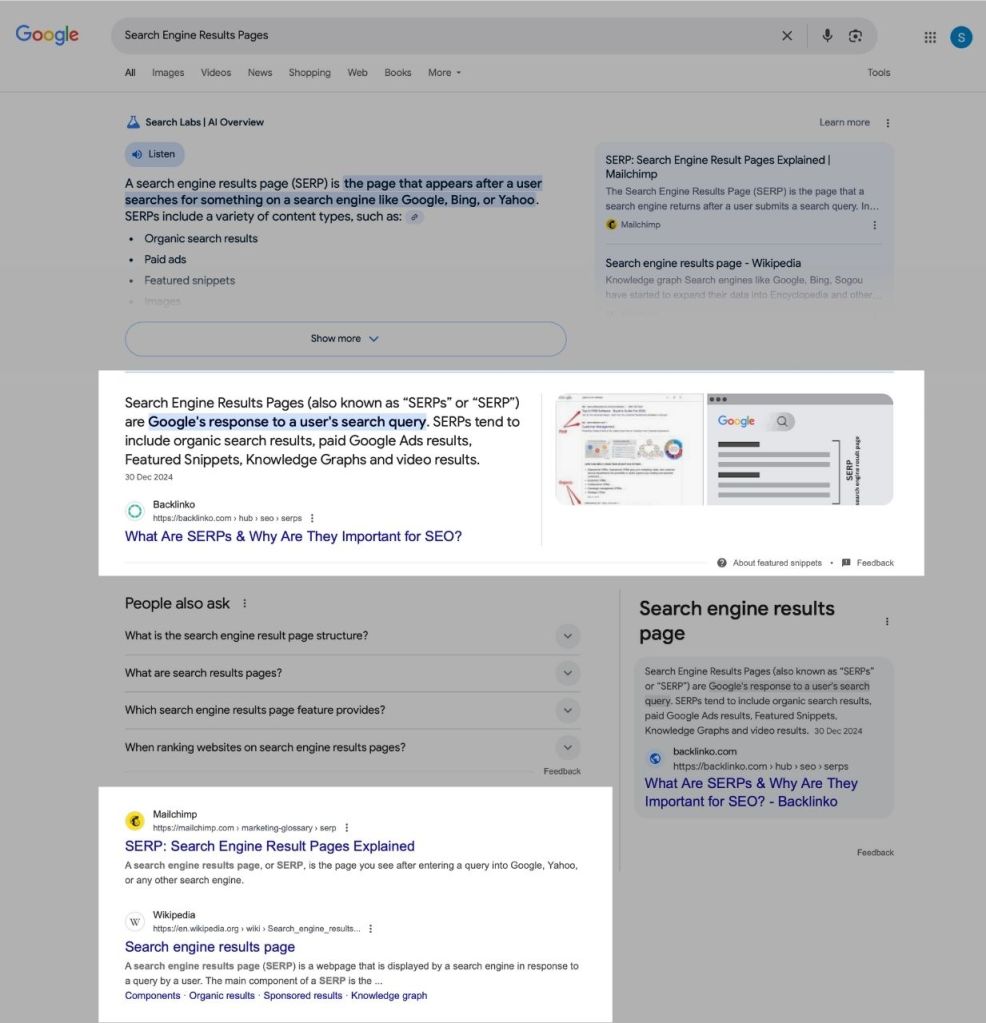What are Search Engine Results Pages (SERPs)
SERPs are the webpages that search engines, like Google, Bing, and others, display to users after they perform a search. These pages list the results of a search query in the form of relevant web pages, videos, images, and other types of content. The goal of SERPs is to present the most relevant and useful information related to the user's query.
Components of a SERP
A typical SERP can contain a variety of components. These can be broadly categorized into organic results, paid results, and other special elements. Here's an overview:

Organic Results
- Title: The clickable headline of an individual result.
- URL: The webpage address.
- Snippet: A brief description or excerpt from the webpage content.
Paid Results
- Text Ads: Appearing above or below organic results, these are paid advertisements relevant to the search query.
- Shopping Ads: Product listings that include images, prices, and additional information about the item.
Rich Snippets and Featured Snippets
Rich snippets and featured snippets enhance the visibility and click-through rates of search results.
- Rich Snippets: These include additional information such as reviews, ratings, event dates, and more.
- Featured Snippets: Pulled from a webpage's content, these provide a quick answer to the user's query and are displayed at the top of the results.
Other SERP Features
In addition to the components mentioned above, here's a list of other elements you might find on a SERP:
- Knowledge Graph: Provides information about people, places, or things related to the search query.
- Local Pack: A map and listing of local businesses relevant to the search.
- Video Results: Displays relevant videos, usually from YouTube.
- Image Pack: Presents a collection of images related to the search.
- News Box: Shows recent news articles about the search topic.
- People Also Ask: Displays related questions and their answers.
Importance of SERPs for Enterprises
Enterprise visibility on SERPs is crucial for several reasons. Here are key points highlighting their importance:
- Increased Traffic: High rankings on SERPs lead to higher click-through rates and increased organic traffic.
- Brand Authority: Consistent visibility on SERPs fosters brand recognition and authority.
- Competitive Edge: Being prominently displayed can position a business ahead of competitors.
- User Engagement: Enhanced SERP features like rich snippets contribute to better user engagement and satisfaction.
Optimizing for SERP Visibility
To improve visibility on SERPs, enterprises should focus on several key optimization strategies:
Search Engine Optimization (SEO)
SEO is crucial for improving organic search rankings. Key SEO practices include:
- Keyword Research: Identify relevant keywords and phrases that potential customers are searching for.
- On-page SEO: Optimize elements within the website, such as title tags, meta descriptions, headers, and content.
- Technical SEO: Ensure the website is technically sound with factors like mobile-friendliness, fast page load times, and secure connections (HTTPS).
- Backlinking: Gain high-quality backlinks from other reputable websites to improve domain authority.
Content Marketing
Creating high-quality, relevant, and engaging content can significantly boost SERP visibility.
- Blog Posts: Write informative and valuable blog posts targeting specific keywords.
- Videos: Produce engaging video content with relevant keywords in titles and descriptions.
- Infographics: Utilize infographics to present data and attract backlinks.
Local SEO
Optimizing for local search results can help businesses that operate in specific geographic locations.
- Google My Business: Create and optimize a Google My Business listing.
- Local Keywords: Incorporate local keywords into content and metadata.
- Citations and Reviews: Ensure consistent NAP (Name, Address, Phone) information across directories and encourage customer reviews.
Paid Advertising
Investing in paid search advertising can also enhance SERP visibility.
- Google Ads: Use Google Ads to create targeted text ads, shopping ads, and display ads.
- Remarketing: Implement remarketing campaigns to re-engage users who have previously visited the site.
Measuring SERP Success
To evaluate the effectiveness of SERP strategies, enterprises should track and measure several key performance indicators (KPIs):
- Click-through Rate (CTR): The percentage of users who click on a search result.
- Organic Traffic: The amount of traffic coming from organic search.
- Bounce Rate: The percentage of visitors who leave the site after viewing only one page.
- Conversion Rate: The percentage of visitors who complete a desired action (e.g., making a purchase or filling out a form).
- Keyword Rankings: The positions that target keywords hold on SERPs.
Conclusion
Search Engine Results Pages (SERPs) are pivotal for online visibility and traffic acquisition. Enterprises need to adopt comprehensive SEO, content marketing, local SEO, and paid advertising strategies to improve their presence on SERPs. By focusing on these areas, businesses can achieve better visibility, more traffic, and increased conversions, ultimately leading to sustained online success.